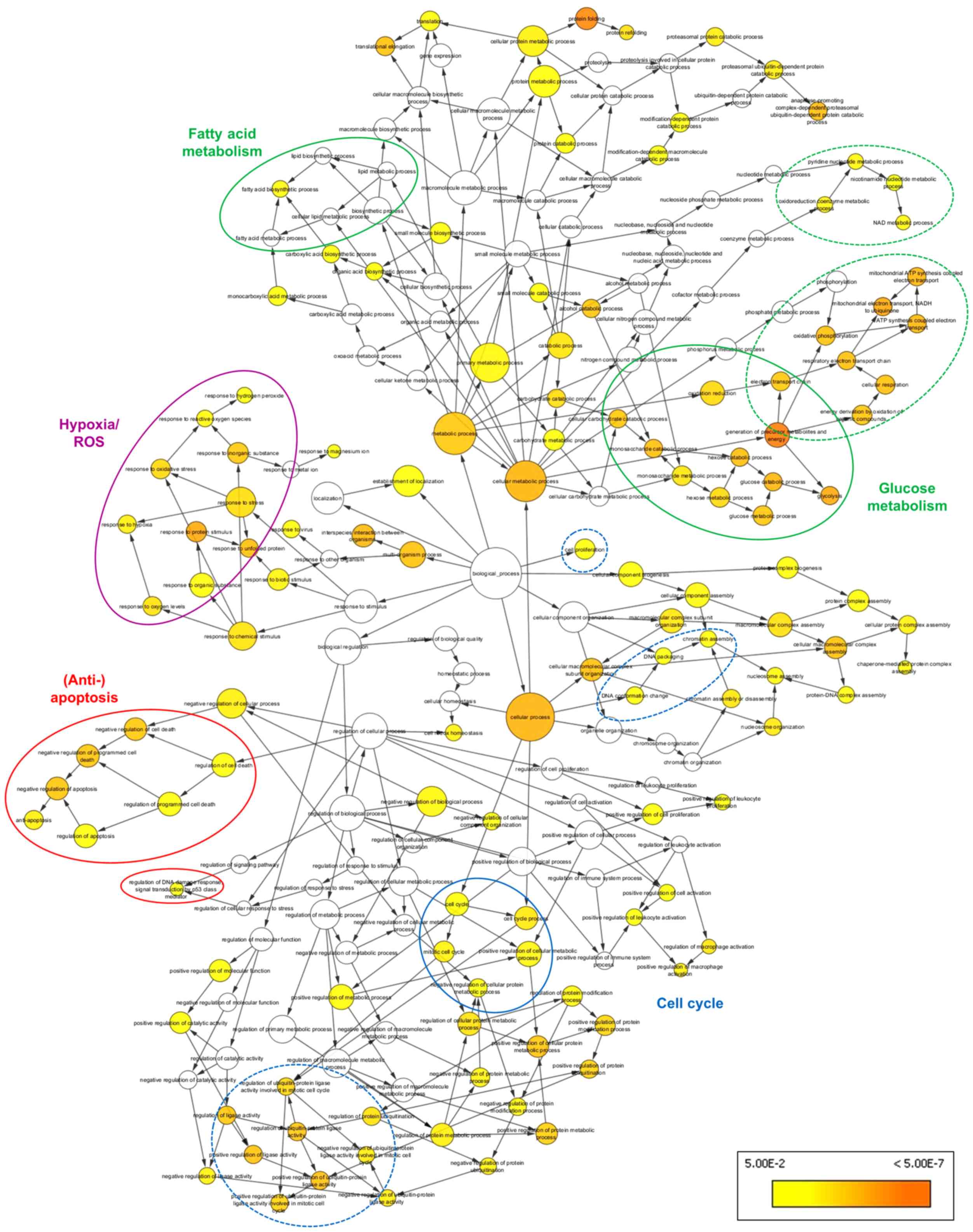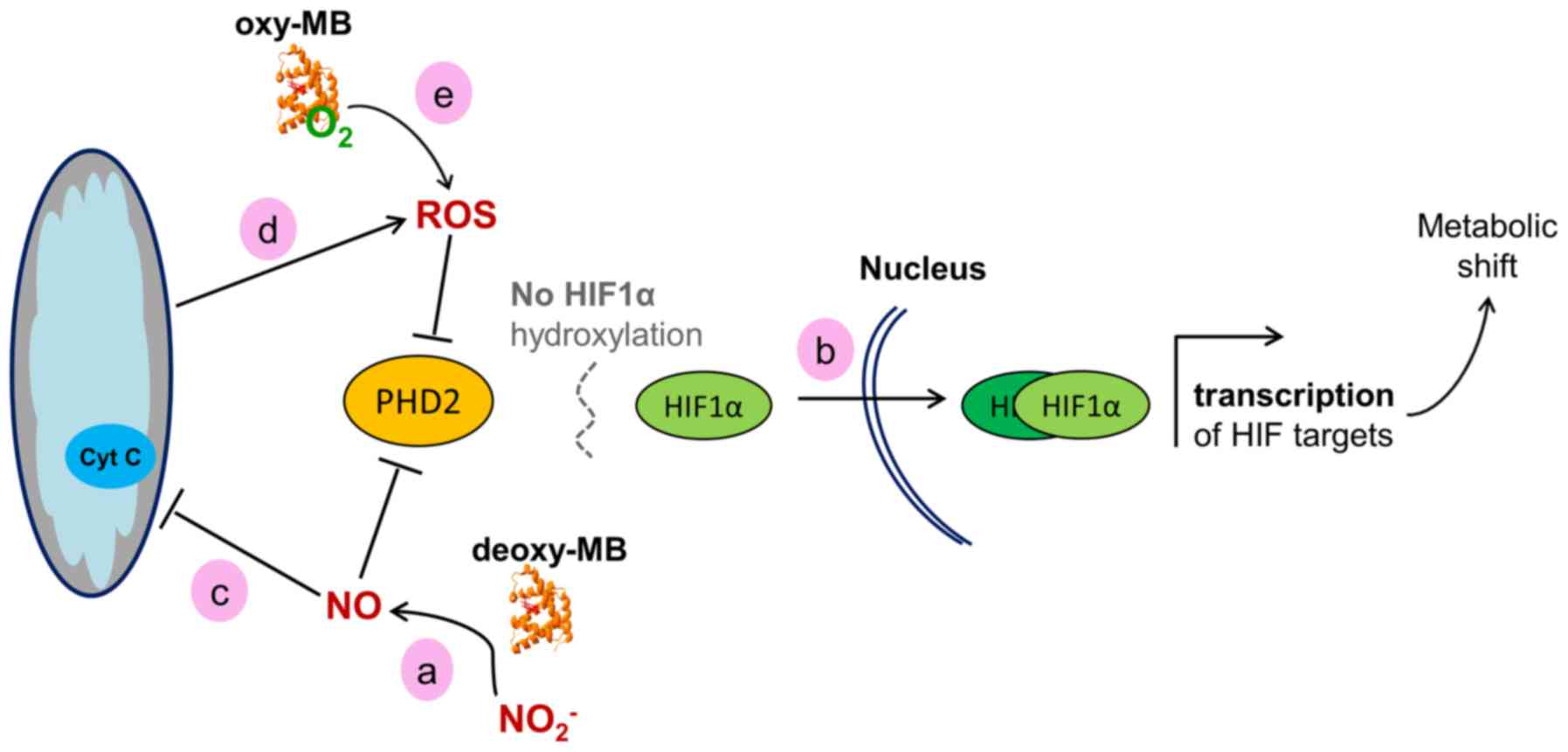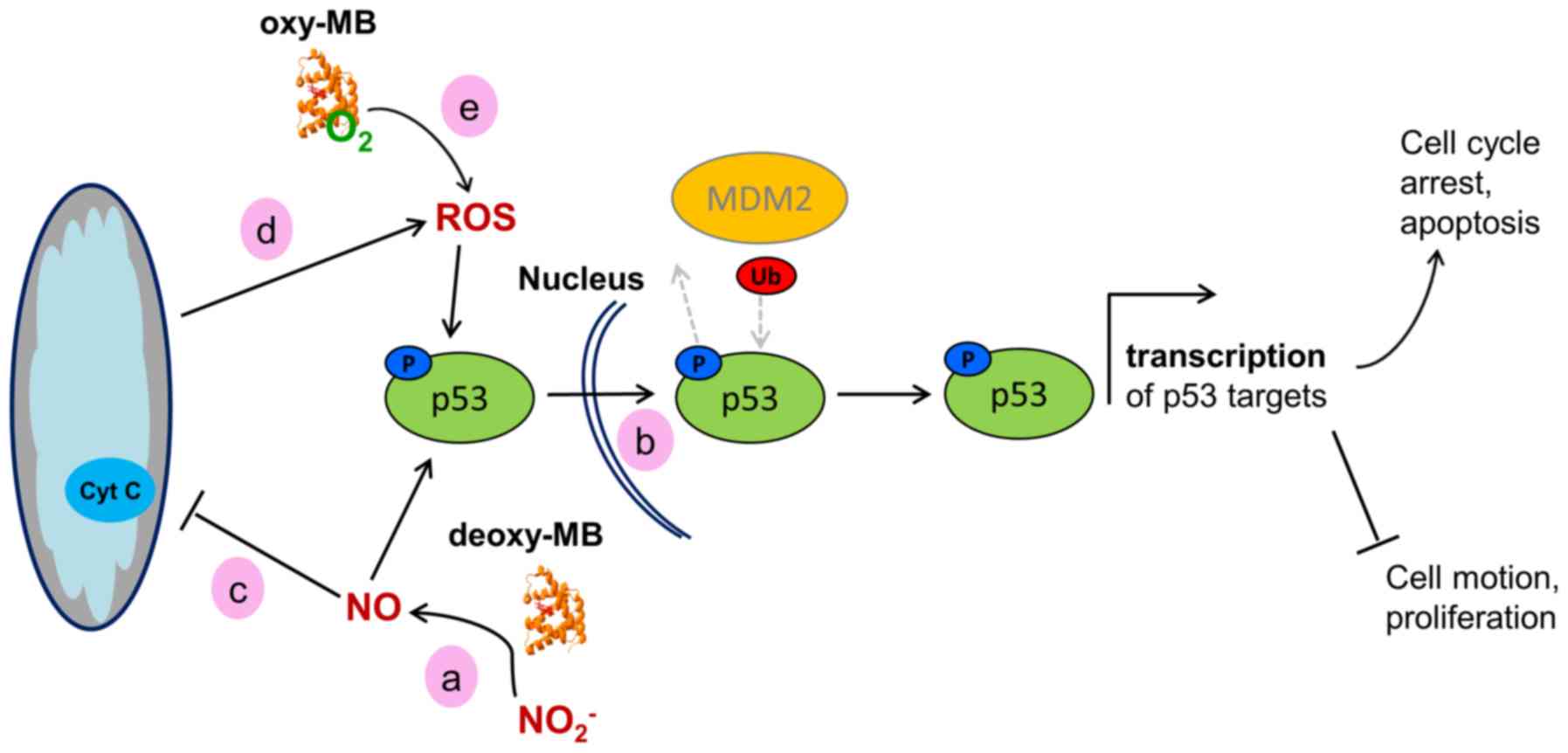|
1
|
Mac Munn CA: VI. Researches on myohamatin
and the histohæmatins. Phil. Trans R Soc. 177:267–298. 1886.
View Article : Google Scholar
|
|
2
|
Millikan GA: Experiments on muscle
hemoglobin in vivo; the instantaneous measurement of muscle
metabolism. Proc R Soc Lond B. 123:218–241. 1937. View Article : Google Scholar
|
|
3
|
Wittenberg BA and Wittenberg JB: Transport
of oxygen in muscle. Annu Rev Physiol. 51:857–878. 1989. View Article : Google Scholar : PubMed/NCBI
|
|
4
|
Wittenberg JB and Wittenberg BA: Myoglobin
function reassessed. J Exp Biol. 206:2011–2020. 2003. View Article : Google Scholar : PubMed/NCBI
|
|
5
|
Endeward V, Gros G and Jürgens KD:
Significance of myoglobin as an oxygen store and oxygen transporter
in the intermittently perfused human heart: A model study.
Cardiovasc Res. 87:22–29. 2010. View Article : Google Scholar : PubMed/NCBI
|
|
6
|
Gödecke A, Flögel U, Zanger K, Ding Z,
Hirchenhain J, Decking UK and Schrader J: Disruption of myoglobin
in mice induces multiple compensatory mechanisms. Proc Natl Acad
Sci USA. 96:10495–10500. 1999. View Article : Google Scholar : PubMed/NCBI
|
|
7
|
Grange RW, Meeson A, Chin E, Lau KS, Stull
JT, Shelton JM, Williams RS and Garry DJ: Functional and molecular
adaptations in skeletal muscle of myoglobin-mutant mice. Am J
Physiol Cell Physiol. 281:C1487–C1494. 2001. View Article : Google Scholar : PubMed/NCBI
|
|
8
|
Flögel U, Merx MW, Godecke A, Decking UK
and Schrader J: Myoglobin: A scavenger of bioactive NO. Proc Natl
Acad Sci USA. 98:735–740. 2001. View Article : Google Scholar : PubMed/NCBI
|
|
9
|
Flögel U, Gödecke A, Klotz LO and Schrader
J: Role of myoglobin in the antioxidant defense of the heart. FASEB
J. 18:1156–1158. 2004. View Article : Google Scholar : PubMed/NCBI
|
|
10
|
Helbo S, Dewilde S, Williams DR, Berghmans
H, Berenbrink M, Cossins AR and Fago A: Functional differentiation
of myoglobin isoforms in hypoxia-tolerant carp indicates
tissue-specific protective roles. Am J Physiol Regul Integr Comp
Physiol. 302:R693–R701. 2012. View Article : Google Scholar
|
|
11
|
Schlater AE, De Miranda MA Jr, Frye MA,
Trumble SJ and Kanatous SB: Changing the paradigm for myoglobin: A
novel link between lipids and myoglobin. J Appl Physiol 1985.
117:307–315. 2014. View Article : Google Scholar : PubMed/NCBI
|
|
12
|
Hendgen-Cotta UB, Kelm M and Rassaf T:
Myoglobin's novel role in nitrite-induced hypoxic vasodilation.
Trends Cardiovasc Med. 24:69–74. 2014. View Article : Google Scholar
|
|
13
|
Sriram R, Kreutzer U, Shih L and Jue T:
Interaction of fatty acid with myoglobin. FEBS Lett. 582:3643–3649.
2008. View Article : Google Scholar : PubMed/NCBI
|
|
14
|
Shih L, Chung Y, Sriram R and Jue T:
Interaction of myoglobin with oleic acid. Chem Phys Lipids.
191:115–122. 2015. View Article : Google Scholar : PubMed/NCBI
|
|
15
|
Chintapalli SV, Jayanthi S, Mallipeddi PL,
Gundampati R, Suresh Kumar TK, van Rossum DB, Anishkin A and Adams
SH: Novel molecular interactions of acylcarnitines and fatty acids
with myoglobin. J Biol Chem. 291:25133–25143. 2016. View Article : Google Scholar : PubMed/NCBI
|
|
16
|
Flögel U, Laussmann T, Gödecke A, Abanador
N, Schäfers M, Fingas CD, Metzger S, Levkau B, Jacoby C and
Schrader J: Lack of myoglobin causes a switch in cardiac substrate
selection. Circ Res. 96:e68–e75. 2005. View Article : Google Scholar : PubMed/NCBI
|
|
17
|
Hendgen-Cotta UB, Esfeld S, Coman C,
Ahrends R, Klein-Hitpass L, Flögel U, Rassaf T and Totzeck M: A
novel physiological role for cardiac myoglobin in lipid metabolism.
Sci Rep. 7:432192017. View Article : Google Scholar : PubMed/NCBI
|
|
18
|
Ruck P, Horny HP, Greschniok A, Wehrmann M
and Kaiserling E: Nonspecific immunostaining of blast cells of
acute leukemia by antibodies against nonhemopoietic antigens.
Hematol Pathol. 9:49–56. 1995.PubMed/NCBI
|
|
19
|
Zhang PJ, Goldblum JR, Pawel BR, Fisher C,
Pasha TL and Barr FG: Immunophenotype of desmoplastic small round
cell tumors as detected in cases with EWS-WT1 gene fusion product.
Mod Pathol. 16:229–235. 2003. View Article : Google Scholar : PubMed/NCBI
|
|
20
|
Flonta SE, Arena S, Pisacane A, Michieli P
and Bardelli A: Expression and functional regulation of myoglobin
in epithelial cancers. Am J Pathol. 175:201–206. 2009. View Article : Google Scholar : PubMed/NCBI
|
|
21
|
Kristiansen G, Rose M, Geisler C,
Fritzsche FR, Gerhardt J, Lüke C, Ladhoff AM, Knüchel R, Dietel M,
Moch H, et al: Endogenous myoglobin in human breast cancer is a
hallmark of luminal cancer phenotype. Br J Cancer. 102:1736–1745.
2010. View Article : Google Scholar : PubMed/NCBI
|
|
22
|
Oleksiewicz U, Daskoulidou N, Liloglou T,
Tasopoulou K, Bryan J, Gosney JR, Field JK and Xinarianos G:
Neuroglobin and myoglobin in non-small cell lung cancer:
Expression, regulation and prognosis. Lung Cancer. 74:411–418.
2011. View Article : Google Scholar : PubMed/NCBI
|
|
23
|
Behnes CL, Bedke J, Schneider S, Küffer S,
Strauss A, Bremmer F, Ströbel P and Radzun HJ: Myoglobin expression
in renal cell carcinoma is regulated by hypoxia. Exp Mol Pathol.
95:307–312. 2013. View Article : Google Scholar : PubMed/NCBI
|
|
24
|
Meller S, Bicker A, Montani M, Ikenberg K,
Rostamzadeh B, Sailer V, Wild P, Dietrich D, Uhl B, Sulser T, et
al: Myoglobin expression in prostate cancer is correlated to
androgen receptor expression and markers of tumor hypoxia. Virchows
Arch. 465:419–427. 2014. View Article : Google Scholar : PubMed/NCBI
|
|
25
|
Meller S, VAN Ellen A, Gevensleben H,
Bicker A, Hankeln T, Gorr TA, Sailer V, Dröge F, Schröck F, Bootz
F, et al: Ectopic myoglobin expression is associated with a
favourable outcome in head and neck squamous cell carcinoma
patients. Anticancer Res. 36:6235–6241. 2016. View Article : Google Scholar : PubMed/NCBI
|
|
26
|
Bicker A, Dietrich D, Gleixner E,
Kristiansen G, Gorr TA and Hankeln T: Extensive transcriptional
complexity during hypoxia-regulated expression of the myoglobin
gene in cancer. Hum Mol Genet. 23:479–490. 2014. View Article : Google Scholar
|
|
27
|
Bicker A, Brahmer AM, Meller S,
Kristiansen G, Gorr TA and Hankeln T: The distinct gene regulatory
network of myoglobin in prostate and breast cancer. PLoS One.
10:e01426622015. View Article : Google Scholar : PubMed/NCBI
|
|
28
|
Kristiansen G, Hu J, Wichmann D, Stiehl
DP, Rose M, Gerhardt J, Bohnert A, ten Haaf A, Moch H, Raleigh J,
et al: Endogenous myoglobin in breast cancer is hypoxia-inducible
by alternative transcription and functions to impair mitochondrial
activity: A role in tumor suppression. J Biol Chem.
286:43417–43428. 2011. View Article : Google Scholar : PubMed/NCBI
|
|
29
|
Gorr TA, Wichmann D, Pilarsky C,
Theurillat JP, Fabrizius A, Laufs T, Bauer T, Koslowski M, Horn S,
Burmester T, et al: Old proteins - new locations: Myoglobin,
haemoglobin, neuroglobin and cytoglobin in solid tumours and cancer
cells. Acta Physiol (Oxf). 202:563–581. 2011. View Article : Google Scholar
|
|
30
|
Mortazavi A, Williams BA, McCue K,
Schaeffer L and Wold B: Mapping and quantifying mammalian
transcriptomes by RNA-Seq. Nat Methods. 5:621–628. 2008. View Article : Google Scholar : PubMed/NCBI
|
|
31
|
Kal AJ, van Zonneveld AJ, Benes V, van den
Berg M, Koerkamp MG, Albermann K, Strack N, Ruijter JM, Richter A,
Dujon B, et al: Dynamics of gene expression revealed by comparison
of serial analysis of gene expression transcript profiles from
yeast grown on two different carbon sources. Mol Biol Cell.
10:1859–1872. 1999. View Article : Google Scholar : PubMed/NCBI
|
|
32
|
Maere S, Heymans K and Kuiper M: BiNGO: A
Cytoscape plugin to assess overrepresentation of gene ontology
categories in biological networks. Bioinformatics. 21:3448–3449.
2005. View Article : Google Scholar : PubMed/NCBI
|
|
33
|
Huang da W, Sherman BT and Lempicki RA:
Systematic and integrative analysis of large gene lists using DAVID
bioinformatics resources. Nat Protoc. 4:44–57. 2009. View Article : Google Scholar : PubMed/NCBI
|
|
34
|
Huang da W, Sherman BT and Lempicki RA:
Bioinformatics enrichment tools: Paths toward the comprehensive
functional analysis of large gene lists. Nucleic Acids Res.
37:1–13. 2009. View Article : Google Scholar
|
|
35
|
Totzeck M, Hendgen-Cotta UB, Kelm M and
Rassaf T: Crosstalk between nitrite, myoglobin and reactive oxygen
species to regulate vasodilation under hypoxia. PLoS One.
9:e1059512014. View Article : Google Scholar : PubMed/NCBI
|
|
36
|
Vousden KH and Prives C: Blinded by the
light: The growing complexity of p53. Cell. 137:413–431. 2009.
View Article : Google Scholar : PubMed/NCBI
|
|
37
|
Saha T, Kar RK and Sa G: Structural and
sequential context of p53: A review of experimental and theoretical
evidence. Prog Biophys Mol Biol. 117:250–263. 2015. View Article : Google Scholar : PubMed/NCBI
|
|
38
|
Lim LY, Vidnovic N, Ellisen LW and Leong
CO: Mutant p53 mediates survival of breast cancer cells. Br J
Cancer. 101:1606–1612. 2009. View Article : Google Scholar : PubMed/NCBI
|
|
39
|
Muller PA, Vousden KH and Norman JC: p53
and its mutants in tumor cell migration and invasion. J Cell Biol.
192:209–218. 2011. View Article : Google Scholar : PubMed/NCBI
|
|
40
|
Choy MK, Movassagh M, Siggens L, Vujic A,
Goddard M, Sánchez A, Perkins N, Figg N, Bennett M, Carroll J and
Foo R: High-throughput sequencing identifies STAT3 as the
DNA-associated factor for p53-NF-kappaB-complex-dependent gene
expression in human heart failure. Genome Med. 2:372010. View Article : Google Scholar : PubMed/NCBI
|
|
41
|
Galluzzo M, Pennacchietti S, Rosano S,
Comoglio PM and Michieli P: Prevention of hypoxia by myoglobin
expression in human tumor cells promotes differentiation and
inhibits metastasis. J Clin Invest. 119:865–875. 2009. View Article : Google Scholar : PubMed/NCBI
|
|
42
|
Braganza A, Quesnelle K, Bickta J, Reyes
C, Wang Y, Jessup M, St Croix C, Arlotti J, Singh SV and Shiva S:
Myoglobin induces mitochondrial fusion, thereby inhibiting breast
cancer cell proliferation. J Biol Chem. 294:7269–7282. 2019.
View Article : Google Scholar : PubMed/NCBI
|
|
43
|
Wang GL, Jiang BH, Rue EA and Semenza GL:
Hypoxia-inducible factor 1 is a basic-helix-loop-helix-PAS
heterodimer regulated by cellular O2 tension. Proc Natl Acad Sci
USA. 92:5510–5514. 1995. View Article : Google Scholar : PubMed/NCBI
|
|
44
|
Stiehl DP, Bordoli MR, Abreu-Rodríguez I,
Wollenick K, Schraml P, Gradin K, Poellinger L, Kristiansen G and
Wenger RH: Non-canonical HIF-2α function drives autonomous breast
cancer cell growth via an AREG-EGFR/ErbB4 autocrine loop. Oncogene.
31:2283–2297. 2012. View Article : Google Scholar
|
|
45
|
Metzen E, Zhou J, Jelkmann W, Fandrey J
and Brüne B: Nitric oxide impairs normoxic degradation of
HIF-1alpha by inhibition of prolyl hydroxylases. Mol Biol Cell.
14:3470–3481. 2003. View Article : Google Scholar : PubMed/NCBI
|
|
46
|
Berchner-Pfannschmidt U, Yamac H, Trinidad
B and Fandrey J: Nitric oxide modulates oxygen sensing by
hypoxia-inducible factor 1-dependent induction of prolyl
hydroxylase 2. J Biol Chem. 282:1788–1796. 2007. View Article : Google Scholar
|
|
47
|
Depping R, Steinhoff A, Schindler SG,
Friedrich B, Fagerlund R, Metzen E, Hartmann E and Köhler M:
Nuclear translocation of hypoxia-inducible factors (HIFs):
Involvement of the classical importin alpha/beta pathway. Biochim
Biophys Acta. 1783:394–404. 2008. View Article : Google Scholar : PubMed/NCBI
|
|
48
|
Berchner-Pfannschmidt U, Tug S, Kirsch M
and Fandrey J: Oxygen-sensing under the influence of nitric oxide.
Cell Signal. 22:349–356. 2010. View Article : Google Scholar
|
|
49
|
Hagen T: Oxygen versus reactive oxygen in
the regulation of HIF-1α: The balance tips. Biochem Res Int.
2012:4369812012. View Article : Google Scholar
|
|
50
|
Niecknig H, Tug S, Reyes BD, Kirsch M,
Fandrey J and Berchner-Pfannschmidt U: Role of reactive oxygen
species in the regulation of HIF-1 by prolyl hydroxylase 2 under
mild hypoxia. Free Radic Res. 46:705–717. 2012. View Article : Google Scholar : PubMed/NCBI
|
|
51
|
Appelhoff RJ, Tian YM, Raval RR, Turley H,
Harris AL, Pugh CW, Ratcliffe PJ and Gleadle JM: Differential
function of the prolyl hydroxylases PHD1, PHD2, and PHD3 in the
regulation of hypoxia-inducible factor. J Biol Chem.
279:38458–38465. 2004. View Article : Google Scholar : PubMed/NCBI
|
|
52
|
Rossignol R, Gilkerson R, Aggeler R,
Yamagata K, Remington SJ and Capaldi RA: Energy substrate modulates
mitochondrial structure and oxidative capacity in cancer cells.
Cancer Res. 64:985–993. 2004. View Article : Google Scholar : PubMed/NCBI
|
|
53
|
Semenza GL, Roth PH, Fang HM and Wang GL:
Transcriptional regulation of genes encoding glycolytic enzymes by
hypoxia-inducible factor 1. J Biol Chem. 269:23757–23763.
1994.PubMed/NCBI
|
|
54
|
Notarnicola M, Messa C, Pricci M, Guerra
V, Altomare DF, Montemurro S and Caruso MG: Up-regulation of
3-hydroxy-3-meth-ylglutaryl coenzyme A reductase activity in
left-sided human colon cancer. Anticancer Res. 24:3837–3842.
2004.
|
|
55
|
Liu Z, Rudd MD, Hernandez-Gonzalez I,
Gonzalez-Robayna I, Fan HY, Zeleznik AJ and Richards JS: FSH and
FOXO1 regulate genes in the sterol/steroid and lipid biosynthetic
pathways in granulosa cells. Mol Endocrinol. 23:649–661. 2009.
View Article : Google Scholar : PubMed/NCBI
|
|
56
|
Marin MC, Jost CA, Brooks LA, Irwin MS,
O'Nions J, Tidy JA, James N, McGregor JM, Harwood CA, Yulug IG, et
al: A common polymorphism acts as an intragenic modifier of mutant
p53 behaviour. Nat Genet. 25:47–54. 2000. View Article : Google Scholar : PubMed/NCBI
|
|
57
|
Dumont P, Leu JI, Della Pietra AC III,
George DL and Murphy M: The codon 72 polymorphic variants of p53
have markedly different apoptotic potential. Nat Genet. 33:357–365.
2003. View
Article : Google Scholar : PubMed/NCBI
|
|
58
|
Deng C, Zhang P, Harper JW, Elledge SJ and
Leder P: Mice lacking p21CIP1/WAF1 undergo normal development, but
are defective in G1 checkpoint control. Cell. 82:675–684. 1995.
View Article : Google Scholar : PubMed/NCBI
|
|
59
|
Vurusaner B, Poli G and Basaga H: Tumor
suppressor genes and ROS: Complex networks of interactions. Free
Radic Biol Med. 52:7–18. 2012. View Article : Google Scholar
|
|
60
|
Andrés NC, Fermento ME, Gandini NA, Romero
AL, Ferro A, Donna LG, Curino AC and Facchinetti MM: Heme
oxygenase-1 has antitumoral effects in colorectal cancer:
Involvement of p53. Exp Mol Pathol. 97:321–331. 2014. View Article : Google Scholar : PubMed/NCBI
|
|
61
|
Wang X, Zalcenstein A and Oren M: Nitric
oxide promotes p53 nuclear retention and sensitizes neuroblastoma
cells to apoptosis by ionizing radiation. Cell Death Differ.
10:468–476. 2003. View Article : Google Scholar : PubMed/NCBI
|
|
62
|
Chen D, Li M, Luo J and Gu W: Direct
interactions between HIF-1 alpha and Mdm2 modulate p53 function. J
Biol Chem. 278:13595–13598. 2003. View Article : Google Scholar : PubMed/NCBI
|
|
63
|
Sermeus A and Michiels C: Reciprocal
influence of the p53 and the hypoxic pathways. Cell Death Dis.
2:e1642011. View Article : Google Scholar : PubMed/NCBI
|
|
64
|
Gartel AL: FOXM1 in cancer: Interactions
and vulnerabilities. Cancer Res. 77:3135–3139. 2017. View Article : Google Scholar : PubMed/NCBI
|
|
65
|
Renault VM, Thekkat PU, Hoang KL, White
JL, Brady CA, Kenzelmann Broz D, Venturelli OS, Johnson TM, Oskoui
PR, Xuan Z, et al: The prolongevity gene FoxO3 is a direct target
of the p53 tumor suppressor. Oncogene. 30:3207–3221. 2011.
View Article : Google Scholar : PubMed/NCBI
|
|
66
|
Klotz LO, Sánchez-Ramos C, Prieto-Arroyo
I, Urbánek P, Steinbrenner H and Monsalve M: Redox regulation of
FoxO transcription factors. Redox Biol. 6:51–72. 2015. View Article : Google Scholar : PubMed/NCBI
|

















